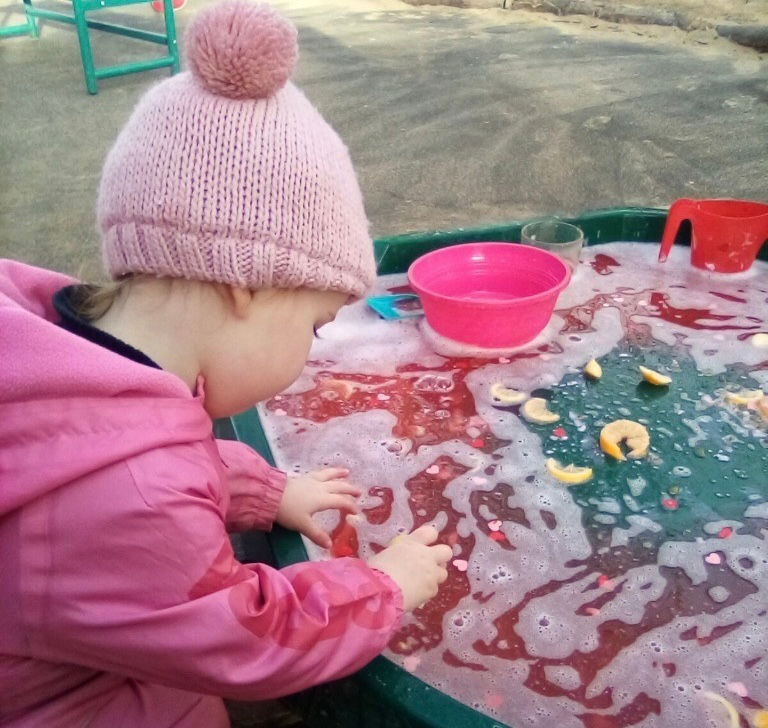WE ARE OPEN 48 WEEKS OF THE YEAR
We are open 48 weeks of the year,
In addition to our toddler and Nursery rooms we are able to provide wrap around childcare for parents who need a longer day with our Breakfast club and After hours club












Toddler & Nursery Rooms
Toddler Cabin
Our Toddler cabin offers children from 12 months the opportunity to explore in a safe & stimulating environment. Through age appropriate activities both indoors and outdoors. Most importantly to engage with children of a similar age.
The Toddler room is managed by Sally who has over 20 years experience in childcare and is NVQ4 qualified.
"I work closely with my team to ensure children feel settled and to ensure we form a close caring relationship as a keyperson. We do our best to ensure each child feels valued and cared for and to encourage their natural curiosity and love of learning." Statement by Sally - toddler room manager


Nursery Room
Nursery room for children from 2 years, has a graduate led workforce team of highly qualified practitioners who form close caring relationships with children and their families. We believe all children are unique and our 'can do' ethos helps all children to reach their full potential.
A well resourced room and large garden support the children in all areas of learning and development.
"We aim for all our children and families to feel completely at ease and that nursery is an extension to their home life. We recognise that for most families we are the first step into the big outside world and we endeavour to make this as easy a transition as possible". Statement by Nikki Finnis-Parker - Avenue Nursery owner.
Avenue Nursery opening times
Nursery Room
Toddler Cabin
Extra hours
Monday - Friday
9am - 3pm
Monday to Friday
9am to 3pm
Breakfast Club
8am to 9am
Forest School
Monday to Friday
9am to 3pm
After Hours Care
3pm to 6pm
exciting changes
No Toy nursery....
Evaluating the impact of Forest school approach on the children’s learning and development, we noticed how play and interaction are enriched by having to create and make up play within the natural environment. No toys meant the children play with the world around them and use natural resources to support their imaginary play. Sticks become phones, wands whatever the child imagines. Play is more physical and the children work far more collaboratively. So we took the decision to remove most of our toys, Trains, dollies, teddies and ride on toys were identified as children’s chosen play resources and are open-ended, meaning they have no planned ending, so play may develop in a variety of ways. The children have to think more for themselves and create resources to enhance their play, facilitating critical thinking and collaboration between the children.
Play all day...
Play is how our children learn, we have evaluated daily practice and made changes to enable free play throughout the whole day. This enables children to truly immerse themselves in their chosen activity and will not be interrupted by routines or adult objectives. The practitioners join in the child’s play to facilitate learning and promote specific skills, whether language, social, creative or academic. By allowing the child to continue self-chosen play, you know they are already interested and motivated. So any group activities are offered to the children but it is a choice if they wish to join in. Snacks and dinnertime are offered at set times in the day and the children are informed when it is ready and can then chose when to stop play to come and eat. Not only does this allow uninterrupted play, but also promotes self-regulation and independence.
Rotational dinner...
Firstly introduced to allow the flow of uninterrupted free play, we soon recognised how valuable it was towards developing self-regulation. Instead of everyone stopping and sitting in one large group, waiting for each other to finish and being totally adult directed. We now just tell the children when dinner is ready and they chose when to come and eat. The children are recognising when they are hungry and choosing when and with who they would like to eat.
Planning in the moment...
Recently we have stopped completing planning sheets for each individual child and have undertaken training on planning in the moment, previously we would write up a next step in all 7 EYFS areas of learning, however this could be quite time consuming and often the children’s fascination and stage of development would have changed by the time the plans were carried out. Now the practitioners observe the child’s play and will add resources or knowledge there and then or set up more challenging versions of the activities and experiences throughout the week. This has led to far less stress for the practitioners and far more meaningful play opportunities for the children.





